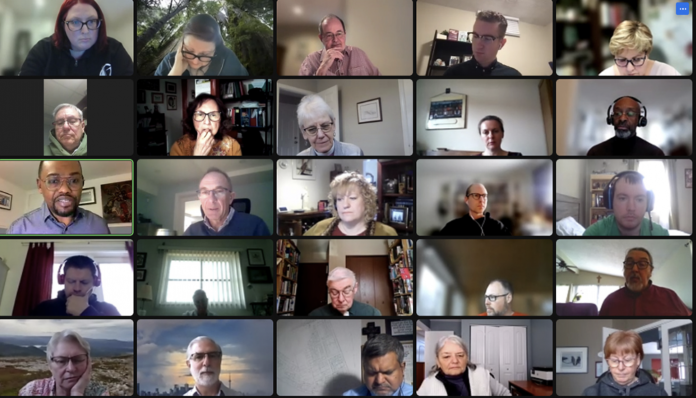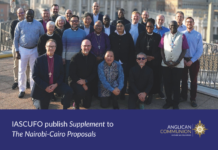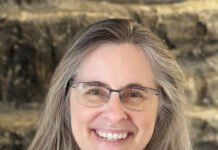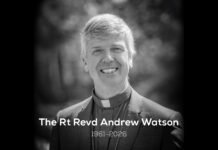Members of Council of General Synod (CoGS) gathered online at 11:30 a.m. ET via Zoom.
Opening Worship
The Rev. Canon Carrie Irwin, chaplain to CoGS, led opening prayer.
Opening Formalities
Archbishop Linda Nicholls, primate of the Anglican Church of Canada, welcomed CoGS members, who voted to adopt the meeting agenda.
General Synod 2023 C Resolutions
Canon (lay) Ian Alexander, prolocutor, led the council through summary notes for three “C” resolutions General Synod had referred to CoGS, which concerned medical assistance in dying (MAID), the formation of a discipleship and evangelism task force, and reviewing the process of electing members to CoGS.
Bishop Helen Kennedy, who had moved Resolution C002 on MAID, said the resolution served as an update and an opportunity to republicize new work the church had done. General Secretary Alan Perry referred to a series of essays that had been recently published as a collection, Faith Seeking Understanding: Medical Assistance in Dying, now available in print and digital formats.
Archbishop Nicholls said it was her understanding the federal government had postponed its rollout of MAID due to ongoing concerns. She said she would be happy to write to Canada’s minister of health about the need for a robust palliative care system. CoGS voted unanimously to pass Resolution C002.
Resolution
That this Council of General Synod:
- Reaffirm the teaching of Scripture that life is a divine gift, the call of the Baptismal Covenant to “respect the dignity of every human being,” and the teaching of Jesus Christ that he has come so that people may have “abundant life” (John 10:10).
- Request the Primate to write to the Minister of Health of the Government of Canada expressing concerns around the expansion of the MAiD Program and to express the ACC’s support for a robust palliative care system as a more appropriate response to human suffering that respects the dignity of all human beings.
- Direct PWSEJ and FWM to work together with members of CoGS to develop ways to educate the church on issues around MAiD, using existing material produced by the FWM team and other resources, making them more widely available, and encouraging their use in dioceses and parishes.
The Ven. Tanya Phibbs, deputy prolocutor, had moved Resolution C006 concerning the discipleship and evangelism task force. She said the church was learning to be invitational and increasing its own discipleship. While this would be a lot of work and Faith, Worship and Ministry is very busy, “We have to start somewhere,” Phibbs said.
John Rye, lay member for the ecclesiastical province of Rupert’s Land, said the motion ought to recognize the evangelist work of Threshold Ministries, formerly the Church Army. He said it should also be explicit about the need to coordinate with Anglicans in other countries, some of who have been more successful in evangelism. Bishop Helen Kennedy noted that Archbishop of York Stephen Cottrell, a strong proponent of evangelism in the Church of England, was in the midst of a cross-Canada tour focusing on discipleship and evangelism.
Andrew Stephens-Rennie, lay member for the province of B.C. and Yukon, called C006 “an important motion.” The diocese of Kootenay, he said, had not been that good at using available resources for evangelism and discipleship and the motion could help bring resources to parishes and congregations. Archbishop Nicholls said there was a lot of material at the Anglican Communion level and many resources available, but that the challenge was communication in terms of getting them out.
Alexander agreed with Stephens-Rennie and the primate. One of the lessons of the Strategic Planning Working Group, the prolocutor recalled, was realizing that even the national church, with limited and even shrinking resources, can help do that connecting work.
The motion to pass C006 carried.
Resolution
That this Council of General Synod direct the Faith, Worship and Ministry Committee to form a Discipleship and Evangelism task force focussed on the central transformational commitment: Invites and Deepens Life in Christ.
That once formed, this task force:
i. develop and strengthen a network of local leaders in creating curriculum resources in print and digital formats for use in dioceses and parishes to support all Anglicans in inviting others into the transformational love of Jesus, and to deepen the faith of those already in our communities;
ii. collaborate with dioceses already actively engaged in similar work, and with the Spiritual Formation for Discipleship Network;
iii. consider how to equip Anglicans to be invitational people in their own contexts;
iv. identify funding needs and opportunities for this work; and
v. explore doing this work in partnership with ecumenical and full communion partners, including the Evangelical Lutheran Church in Canada and Moravian Church Canada, and other groups as appropriate.
Concerning Resolution C012, on the process of electing members to CoGS, Archbishop Nicholls said the current process can be arcane and confusing. Kim Chadsey, lay member from the province of Ontario who had moved the resolution, referred to the explanation that accompanied C012. The note said rules governing the process by which ecclesiastical provinces elect representatives to CoGS are “inconsistently followed and arguably incoherent, in that dioceses often do not provide the requisite full slate of nominees, or those that do are obliged to nominate individuals who do not actually wish to serve on the Council.” Resolution C012, it said, aimed to develop a new system of election for CoGS members that would take these factors into account.
Stephens-Rennie, who seconded the motion, added, “This is related to other, bigger challenges we’re facing.” Both in his own province and in speaking to others, he said, there had been challenges in finding people who would volunteer to be on a slate for CoGS, including those who would not do the work if elected. Archbishop Nicholls said these concerns would be important information to feed into the primate’s commission, which aims to present responses to the Anglican Church of Canada’s financial and structural challenges at General Synod 2025.
Canon Clare Burns, chancellor, said the first meeting of the Governance Working Group would take place near the end of March. “It is our habit to look across the Communion to see what other people are doing in regard to canonical changes,” she said, especially in The Episcopal Church and the Anglican Church of Australia. CoGS passed Resolution C012.
Resolution
That this Council of General Synod direct the Governance Working Group to review the process by which members of CoGS are elected by ecclesiastical provinces at meetings of the General Synod, and provide a report to Council on recommended options.
Members took a 15-minute break from 12:30 to 12:45 p.m.
Bible Study
Irwin led CoGS in Bible study. Council read and discussed John 3:14-21, which details the conversation between Jesus and Nicodemus. In this gospel reading, Irwin said, “We hear that the whole of humanity is offered Jesus as healing.”
Feedback from November Meeting
Council split into breakout groups to discuss feedback from their last meeting in November 2023, then re-gathered in plenary. Speaking on behalf of the planning and agenda team, Dean Tim Dobbin said CoGS would keep its group norms as a dynamic document that members could keep contributing to as CoGS moves forward. Council members in their feedback had said they liked the idea of consensus decision-making.
Three CoGS members shared their own feedback in plenary. Dorothy Patterson, lay member for the province of Ontario, said as a newcomer, she found CoGS to be friendly and appreciated the work done by the planning and agenda team. She enjoyed the time used at the previous meeting for Bible study, hymns, and game night. Patterson said she would have liked greater opportunity to move to different tables to meet other CoGS members, and would have liked to have seen National Indigenous Anglican Archbishop Chris Harper introduced to speak about Indigenous ministry. She also suggested a signup sheet for members to get copies of slide presentations.
The Ven. Victor-David Mbuyi Bipungu, clergy member from the province of Canada, said CoGS needed to balance business and community-building, “but if business is more complex, we should allocate more time to it than community-building.” He said he was glad to attend worship and as a new member had learned a lot about the national church and what is expected of CoGS.
Adam MacNeil, youth member from the province of Ontario, spoke about possibly expanding the variety of liturgy offered, such as from the Book of Common Prayer, Moravian texts, or liturgical texts for trial use. He suggested more time for engagement after presentations, and having questions on report topics provided before the meeting.
Dobbin thanked the three for their contributions and said the planning and agenda team would take feedback from CoGS into consideration in putting together the agenda for their next meeting in May and June.
Members broke for lunch from 1:15 to 2:15 p.m.
2023-2025 CoGS Deliverables
CoGS split into four breakout groups to discuss deliverables General Synod had requested:
- Resolution A101: Commissioning a document on the history, structure and governance of the Anglican Church of Canada;
- Resolution A102-R1: Create an implementation group for the five transformational commitments in the church’s new strategic plan;
- Resolution A202-R1: All national ministries and dioceses to engage more fully the historical reality of the Anglican Church of Canada’s involvement in residential schools and take steps to address their continuing impact; and
- Resolution A202A: All national ministries and dioceses to engage more fully the historical reality of the Anglican Church of Canada’s involvement in slavery and other forms of racial injustice and take steps to address their continuing impact.
General Secretary Perry, who facilitated discussion of A101, said his group had considered the question of who the audience would be for a document on the church’s history, structure and governance; who would put together the document, how to engage the church with it, and how communications might help disseminate the document. Phibbs, who served as notetaker, said the goal was to help people understand the role of the national church and how its structure works. “If we want to change the church—and the church can always need changes—we need to understand why we are the way we are,” Phibbs said. Such a document, she added, might also reduce frustrations at General Synod if people understand better how the national church works, with the goal of having the document ready for General Synod 2025.
CoGS decided to form a working group to further the work of A101, consisting of the general secretary, General Synod archivist Laurel Parson, Chancellor Clare Burns, Bishop Susan Bell; a member of the communications staff, and potentially Alan Hayes, professor emeritus of church history at Wycliffe College.
Alexander said the breakout group on A102-R1 found the transformational commitments were central to what is going on both at General Synod and in dioceses and parishes across the country. “What we need is a group that can continue to hold up the work that is being done and demonstrate its importance and value, with a view to celebrating it and encouraging others to come alongside and do that work,” Alexander said, adding that communications would be a vital part of this work. The breakout group had said it was important moving forward to understand how the transformational commitments related to Sacred Circle, especially the Covenant and Our Way of Life, as well as to the work of the primate’s commission.
CoGS decided to form another working group to address communicating the transformational commitments. The primate said she and the general secretary would have a discussion about who might be on the working group and approach metropolitans with an eye to their providing a consultative role, as well as members of the Strategic Planning Working Group. Taking into consideration notes from the present meeting, Nicholls said, they could draft terms of reference for the working group to present to CoGS in May.
Concerning Resolution A202-R1 on residential schools, National Indigenous Archbishop Chris Harper recounted a reconciliation and truth-telling tour he had taken across Canada in 2023. At that time, Harper said, he realized “there is a reality we have in the church to understand the historical legacy we all have to share and live into.” The church is at a crossroads, he said. The primate said there was a need to look at the church’s communications strategies, possibly doing an audit at the national level on what General Synod ministries have been doing to address the historical reality of residential schools and its impact on their ministries.
CoGS opted to form a working group to move forward on A202-R1. Harper, Kennedy, and Stephens-Rennie volunteered to serve on the working group. Perry said the work was also connected to work he and reconciliation animator Dawn Maracle had been doing on Call to Action 46 from the Truth and Reconciliation Commission, concerning the All-Parties Agreement.
On Resolution A202A, CoGS decided that the working group formed to look at the history of the Anglican Church of Canada for Resolution A101 should also include within it a section that looks at the church’s historical role in slavery and injustice, which could then be sent on to coordinating committees for feedback.
Closing Prayer
The primate thanked CoGS for their conversation and said she was looking forward to their next meeting, which will take place in person May 31 to June 2. She wished council members a blessed Holy Week and Easter, describing Holy Week as a “summation of everything God’s love for us is about.” Referring to ongoing events in Israel and Gaza, she reiterated that in spite of pain and struggle, “God is with us and every year that hope is renewed at Easter.”
Irwin led closing prayers.
Council adjourned at 4 p.m.



